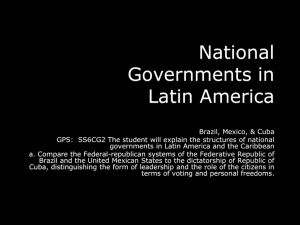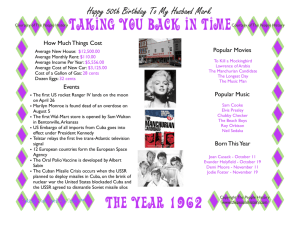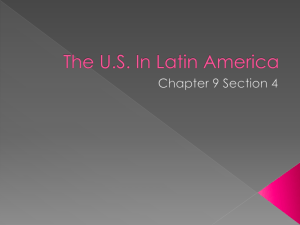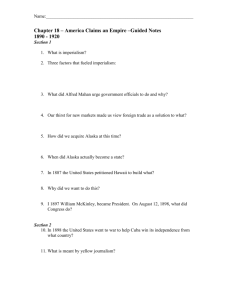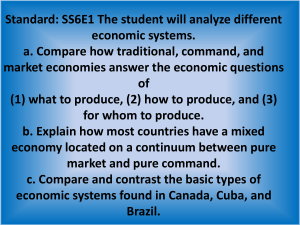latin_america_govt
advertisement
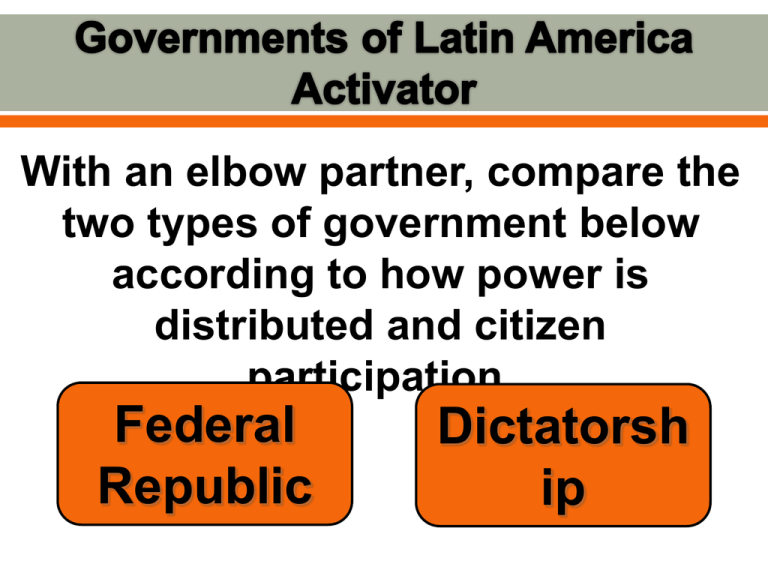
With an elbow partner, compare the two types of government below according to how power is distributed and citizen participation. Federal Republic Dictatorsh ip Standard: SS6CG2a. Compare the federal-republican systems of the Federative Republic of Brazil (Brazil) and the United States Mexican (Mexico) to the dictatorship of the Republic of Cuba (Cuba). Before we begin our studies of specific governments of Latin America, let’s review some important concepts. Chief of State: Leader of a country who represents the state at official and ceremonial functions, but who may not be involved with the day-to-day activities of the government. Head of Government: A country’s top administrative leader who is designated to manage the day-today activities of the government. Chief of State Head of Government What is the Legislature? The Law making body of government. For the U.S., it is Congress [House of Representatives and the Senate]. Brazil and Mexico both have a Federal Republic. A Federal Republic is a state in which the powers of the central government are restricted and the parts (states, colonies, provinces) keep a degree of selfgovernment. Ultimate sovereign (supreme) power rests with the people who chose their representatives in government. Brazil has a President who is both the chief of state and head of government The President is elected by popular vote The Bicameral National Congress (legislature with two houses) members are also Citizens vote to elect both the President and the members of the Legislature Voting is mandatory between the ages of 18-70 (voluntary between the ages of 16-18 and People can work where they want or start a business [free trade and free enterprise]. Citizens enjoy personal freedoms like freedom of speech and freedom of assembly. Mexico has a President who is both the chief of state and head of government The President is elected by popular vote The Bicameral National Congress (legislature with two houses) members are also Citizens vote to elect both the President and the members of the Legislature Voting is mandatory for citizens over the age of 18 (but it is not enforced) People can work where they want or start a business [free trade and free enterprise]. Citizens enjoy personal freedoms like freedom of speech and freedom of assembly. Cuba is a dictatorship in which the ruler has absolute power (not restricted by a constitution of laws). Cuba has a President who is both the chief of state and head of government. The President (dictator) is elected by the Unicameral National Assembly (legislature with one house). The last election was Fidel Castro ruled Cuba from 1959 to 2008. When he stepped down his brother Raul became ruler. Cuba’s official name is the Republic of Cuba. Why is this misleading? The members of the Legislature are those officially sanctioned (approved) by Cuba’s Communist Party. They run for office unopposed. Citizens can “vote” at the age of 16 for members of the Legislature. However, citizens can only vote for candidates selected by the Communist Party. Cuba’s citizens do not have personal freedoms like freedom of speech. They can be put in jail for criticizing the Communist Party or the president. People cannot just work where they want to work or open their
